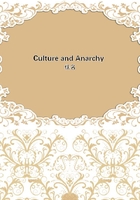
第68章
49 In the meanwhile, since out Liberal friends keep loudly and resolutely assuring us that their actual operations at present are fruitful and solid, let us in each case keep testing these operations in the simple way we have indicated, by letting the natural stream of our consciousness flow over them freely; and if they stand this test successfully, then let us give them our interest, but not else. UTEL: Culture and Anarchy CONCLUSION1 And so we bring to an end what we had to say in praise of culture, and in evidence of its special utility for the circumstances in which we find ourselves, and the confusion which environs us. Through culture seems to lie our way, not only to perfection, but even to safety. Resolutely refusing to lend a hand to the imperfect operations of our Liberal friends, disregarding their impatience, taunts, and reproaches, firmly bent on trying to find in the intelligible law of things a firmer and sounder basis for future practice than any which we have at present, and believing this search and discovery to be, for our generation and circumstances, of yet more vital and pressing importance than practice itself, we nevertheless may do more, perhaps, we poor disparaged followers of culture, to make the actual present, and the frame of society in which we live, solid and seaworthy, than all which our bustling politicians can do.
2 For we have seen how much of our disorders and perplexities is due to the disbelief, among the classes and combinations of men, Barbarian or Philistine, which have hitherto governed our society, in right reason, in a paramount best self; to the inevitable decay and break-up of the organisations by which, asserting and expressing in these organisations their ordinary self only, they have so longed ruled us; and to their irresolution, when the society, which their conscience tells them they have made and still manage not with right reason but with their ordinary self, is rudely shaken, in offering resistance to its subverters. But for us,--who believe in right reason, in the duty and possibility of extricating and elevating our best self, in the progress of humanity towards perfection,--for us the framework of society, that theatre on which this august drama has to unroll itself, is sacred; and whoever administers it, and however we may seek to remove them from their tenure of administration, yet, while they administer, we steadily and with undivided heart support them in repressing anarchy and disorder; because without order there can be no society, and without society there can be no human perfection.
3 And this opinion of the intolerableness of anarchy we can never forsake, however our Liberal friends may think a little rioting, and what they call popular demonstrations, useful sometimes to their own interests and to the interests of the valuable practical operations they have in hand, and however they may preach the right of an Englishman to be left to do as far as possible what he likes, and the duty of his government to indulge him and connive as much as possible and abstain from all harshness of repression. And even when they artfully show us operations which are undoubtedly precious, such as the abolition of the slave-trade, and ask us if, for their sake, foolish and obstinate governments may not wholesomely be frightened by a little disturbance, the good design in view and the difficulty of overcoming opposition to it being considered,--still we say no, and that monster-processions in the streets and forcible irruptions into the parks, even in professed support of this good design, ought to be unflinchingly forbidden and repressed; and that far more is lost than is gained by permitting them. Because a State in which law is authoritative and sovereign, a firm and settled course of public order, is requisite if man is to bring to maturity anything precious and lasting now, or to found anything precious and lasting for the future.
4 Thus, in our eyes, the very framework and exterior order of the State, whoever may administer the State, is sacred;and culture is the most resolute enemy of anarchy, because of the great hopes and designs for the State which culture teaches us to nourish. But as, believing in right reason, and having faith in the progress of humanity towards perfection, and ever labouring for this end, we grow to have clearer sight of the ideas of right reason, and of the elements and helps of perfection, and come gradually to fill the framework of the State with them, to fashion its internal composition and all its laws and institutions conformably to them, and to make the State more and more the expression, as we say, of our best self, which is not manifold, and vulgar, and unstable, and contentious, and ever-varying, but one, and noble, and secure, and peaceful, and the same for all mankind,--with what aversion shall we not then regard anarchy, with what firmness shall we not check it, when there is so much that is so precious which it will endanger!